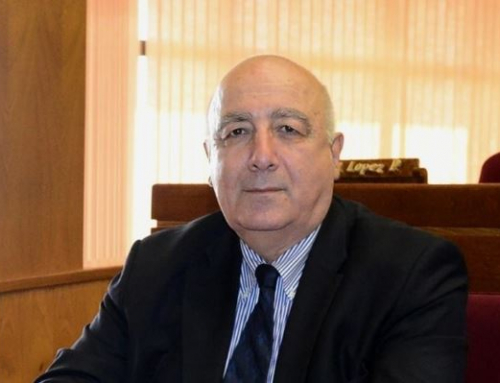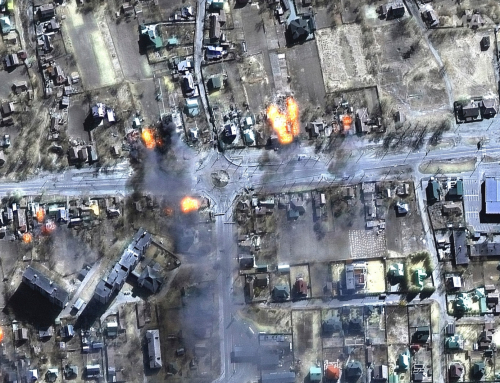by Arnold Stepanian, chairman of the movement Multinational Georgia.
Israel, the Israel Lobby and Georgian Authorities
Georgian authorities’ interest in Israeli capital is hard to overestimate. Since 2003, the authorities have been made efforts to strengthen relations with the Israeli lobby in the U.S., but apparently, without durable success so far. Ensuring the interest and support on the part of Israel through the Israeli lobby could have been beneficial for the country and for Georgian authorities as well in the economic and accordingly, political sense. There are minimum two visions of future of the South Caucasus region in a multipolar world, one of which implies determination of limits to spheres of influence of Russia in the South Caucasus following the borders of the former USSR. One of the conditions is to win Russia’s support on issues of Iran. Apparently, the Georgian Government, which had come into power after the Rose Revolution in 2003, has been actively contradicting the said vision. The formula of counteraction with regard to the mentioned approach was to buy a guarantee of stability ending military provocations from the northern neighbor by attracting investments to the country, including Israeli investments on preferential conditions. As it seems, the main packages offered by the Georgian authorities to implement the mentioned programme were: selling land on preferential terms, implementation of joint projects in different areas, purchasing by Georgia Israeli-made weapon being not the cheapest one in the world market, cooperation on issues of Iran, participation in international hydrocarbon projects, etc. A part of them was successfully accomplished before the Russia-Georgia War of 2008. Two former Georgian ministers of Jewish origins, Kezerashvili and Iakobashvili, may have served as main providers of this package. Afterwards, appointing Iakobashvili as Ambassador of Georgia to the U.S. could have been dictated also by the need to activate works with the Israeli lobby in the U.S., part of which, according to experts, shares the above mentioned approach on setting limits to geopolitical areas of responsibility.
The degree of involvement of Israel and the Israeli lobby in the development of the situation in Georgia depends on the degree of success of implementation of package containing Georgian proposals related to “Jewish capital”.
Iran and Georgia
Iran, as a regional power, implying its presence in the South Caucasus, managed to acquire a range of leverages for the past years in two countries of the region – Armenia and Azerbaijan. Georgia, so far has been strictly limiting expansion of its regional neighbour’s influence on its territory. The position of official Tbilisi, did not envisage serious political contacts with country having growing geopolitical ambitions, which was called the source of regional instability in the Middle East. Iran avoided obstacles to realization of pragmatic real politics in Georgia by drawing the lines of religious-ideological approaches. Apparently, the immediate goal was attained, Iran could popularize the meaning of religion in the identification process for the major part of Shias Muslim minority, living in compact settlements in the southern part of Georgia, and accordingly, form a basis of its influence and realization of its interests. Iran’s ambitions to play in the Georgian economic and respectively, political fields can be defined with following reasons:
– Georgia serves as a buffer zone between Iran’s regional political rival – Turkey, and Northern Caucasus Republics of Russia, where the majority of the population is Muslim Sunnis.
– Growing influence of Israel and Israeli capital.
– Georgia’s aspiration to integrate into NATO and close cooperation with Iran’s opponents in the Middle East.
It is even enough to mention one of the above mentioned reasons to suppose that Iran is keen to enhance the level of its involvement in Georgia. The immediate task may imply neutralizing the territory, which may in theory serve as a foothold for conducting hostile acts against the Iranian ruling regime. It is expedient to note that Iran is interested in making efforts to build the environment, where in future it will be possible to tear Georgia away from the influence of Western allies and close the chain at the Black Sea and Russia. Iran continues diligently searching for leverage to influence the situation in Georgia through support or initiating various processes, such as for instance, interethnic or interreligious relations. Instruments may be various, although it is apparent that religious and ethnic minorities will play quite an important role. Conflict management on one of the battlefields will definitely render additional trump cards in the entire process. Another important topic related to interests in Georgia-Iran relations is the search for new donors on the part of Georgia. Apparently, the level of Israeli investments has considerably decreased since 2008. The things did not go well either with Arabs, as potential donors, in fact, almost all Georgian-Arabian investment projects “went away” with emotional contacts between Georgian authorities and former rulers of the White House. European states cannot continue supporting Georgia financially at the same level due to the crisis. The USA have introduced stricter requirements for Georgian authorities to continue and increase financing, which implies ensuring free and fair parliamentary elections in October 2012. The circle of potential donors has narrowed. Under similar conditions, a situation has been developed too favourable to involve Iran in the game. On the one part, Georgia is facing a financial crisis, on the other, there is a rich neighbor in the region, which is keen to replace the financial presence of Israeli and Western capital with its own. Anyway, since 2010, Georgia-Iran relations moved to a qualitatively new level: the two countries have mutually introduced visa-free travel, an Iranian consulate has been opened in Batumi, the number of Iranian tourists to Georgia has increased, direct Tbilisi-Teheran flights were introduced. The Embassy of Iran in Georgia has become considerably active, which reopened its doors and started to organize different events, such as meetings with students and receptions, directed at positioning its views on political processes underway in the world.
However, searching for an alternative donor is not the only suggestion being raised, some also consider other reasons for why Georgian authorities are intensifying relations with Iran. Although, in such circumstances the possibility of alternative financing may deserve some interest; the scenario drawn up above is linked to an extremely high risks for many geopolitical interest groups and respectively, is not likely to happen. The Georgian authorities understand very well that their indispensability as partners of Western states is less dependent on the degree of importance of functions that they perform. Georgia is very successful in being partner to the Western coalition in Afghanistan and Iraq. In order to strengthen its importance, the Georgian authorities permanently seek other possibilities on the international arena. One of such possibilities may well be an offer of venue for informal negotiations of western partners with Iran. At the same time, the policy of official Tbilisi remains twofold with regard to Iran; Georgia’s aspiration to become a NATO member, the development of military relations with the U.S. and Israel give grounds to suppose that Georgia may offer its territory for conduct of possible military actions of allies against Iran.
Georgia, Internal Political Factors
Elections, political subjects and minorities
One may accept that internal political factors in Georgia can likewise serve as additional incentives for the development of Georgia-Iran relations. Against the background of a possible start of conflict with Iran, in order for the authorities to adopt risky decisions, it is more than desirable to have the trust and support of the population, in other words, to be elected through fair and free elections. An alternative, but less reliable, way may also be strict control over all areas of internal politics of the country and the society. Young Georgian reformists, who had come to power after the Rose Revolution in 2003, managed to drastically change the situation in the country, develop Georgia from failed state in the 90s into a young democracy, making big success on its road to building state institutions and reforms. However, reforms even though successfully implemented in very little timeframe – 10 years, have a significant “flaw” for those who conduct them. As a rule they do not facilitate growth of popularity of the government within the country, for, very often, in the short-term perspective, these reforms have a negative impact on the social conditions of citizens. Accordingly, in case fair elections are held, the chance to retain as much power as “one can take” is not big. While understanding this, authorities started to create a counterbalance inside the country as well as outside. Measures directed to weaken political opponents, limit freedom of expression, and infringement of human rights, led to a weakening of the civil sector and political media with different opinions – opposition, and respectively, to some extent, comparative strengthening of the position of the ruling National Movement party. At the same time, these methods caused problems with Western partners. For the past several years, Western partners repeatedly conveyed a message to Georgian authorities about the need for new incentives to solidify success in the democratic development process in Georgia, which in other words would mean to conduct fair elections, that may result in forcing the existing political elite to free some space or give up power. One should not entirely exclude the possibility that part of the ruling political elite might be considering all variants of retaining power. If for some reason they are unable to fulfill an order “for democracy” from the population and Western partners, making investments in strengthening the Georgian state, naturally, political as well as financial support to the ruling political class may weaken, that would mean facing the risk of “loosening the chair” and accordingly, losing power with all ensuing outcomes for the latter.
Most probably the authorities will try to maximise their gain, which means that the conduct of parliamentary elections will not be more than semi-fair. Fulfillment of the demand of Western partner-donors regarding the conduct of fair elections is linked with the prospect of further political and financial support to Georgia. Given such a scenario, the published official results of elections in Georgian regions with compact settlements of ethnic minorities (Samtskhe-Javakheti – Armenians, Kvemo Kartli – Azerbaijannis), which traditionally give 15-17% of votes of total electorate in the country to ruling elite, will be decisive.
Why do authorities consistently receive such high figures? First and foremost, this is due to an “iron logic”: the pursuit of a policy of strict control in places with compact settlements of ethnic minorities. Such policy keeps the local civil societies in the manner of a “compressed spring”, which makes it extremely difficult for alternative internal political subjects and external actors to intervene effectively. The authorities unanimously announce Russia and other neighbouring countries in the region as external actors. While limiting their influence on processes in Samtskhe-Javakheti and Kvemo-Kartli to the maximum extent, official Tbilisi, by doing so, creates an additional guarantee for state security, which is important for being ablt to perform the functions of a stable partner in international projects. As a result, these regions are subject to some preferences. Even political subjects that are at odds with the ruling National Movement often overlook the methods which the ruling power uses to secure overwhelming support from the electorate. The international community accepts the argument that conducting elections under conditions in which civil society finds itself in the regions of Samtskhe-Javakheti and Kvemo Kartli at the same level as in places with more politically-literate and active electorate, such as in the Capital of Georgia – Tbilisi, is extremely difficult.
On the other hand, taking advantage of the situation, access is limited for the internal political actors – the opposition as well to the abovementioned territories.
The Georgian government definitely uses arguments of strict control over all processes in those territories in order to prevent activities of political opponents, to make such activities very expensive for the opposition (maximum expenses, minimum dividends), as well as to make the most “conscious” of them pay by the formula “Authorities ensure security and integrity of the state with strict control over regions with minorities – the opposition does not try to force democratic values, such as pluralism, protection of human rights and fundamental freedoms”. Apart from political subjects, there are also human rights organisations, paving the way to democratic values, that fall under this “pressure”. Expansion of their activities in these territories is very difficult, because of the lack of adequate resources necessary to conduct human rights-related activities on the ground, on the one hand, strong contradiction from the authorities to the implementation of human rights activities. The present policy resulted in the creation of a reality, where the development of civil society in the regions with compact settlements of minorities became a difficult task.
Another threat coming from the policy of strict control is the subjects used as a means to exercise control. These are, firstly, local clans, whose number has not only increased for the past years (the more interest groups, the bigger fight for power, the more contradictions, easier is to exercise control), but they were also strengthened. Despite the visible control by the authorities (MoIA) over the local clans, the latter are still dependent on various external powers (Russia, Armenia, Azerbaijan, Turkey, Iran) and groups within their orbit. In the end, leaders of the clans are not known as patriots to their country, their main interest lies in obtaining financial dividends from political engagement. The risk related to the level of stability of the clans, while preserving loyalty to the government and accordingly, to the state, is high due to the instability of value-based incentives. Another factor that could influence minorities-related processes in the regions is the lack of a stable counterbalance – developed civil society with literate leaders, interested in the development and strengthening of the state and accordingly, the regions where they reside. The system of established values resulting from several years of strict control minimized participation, and respectively, the role of citizens proper, in the processes at the local as well as national level. In addition, there was disillusionment with fundamental values necessary for building democratic and sustainable civil society.





Leave A Comment
You must be logged in to post a comment.